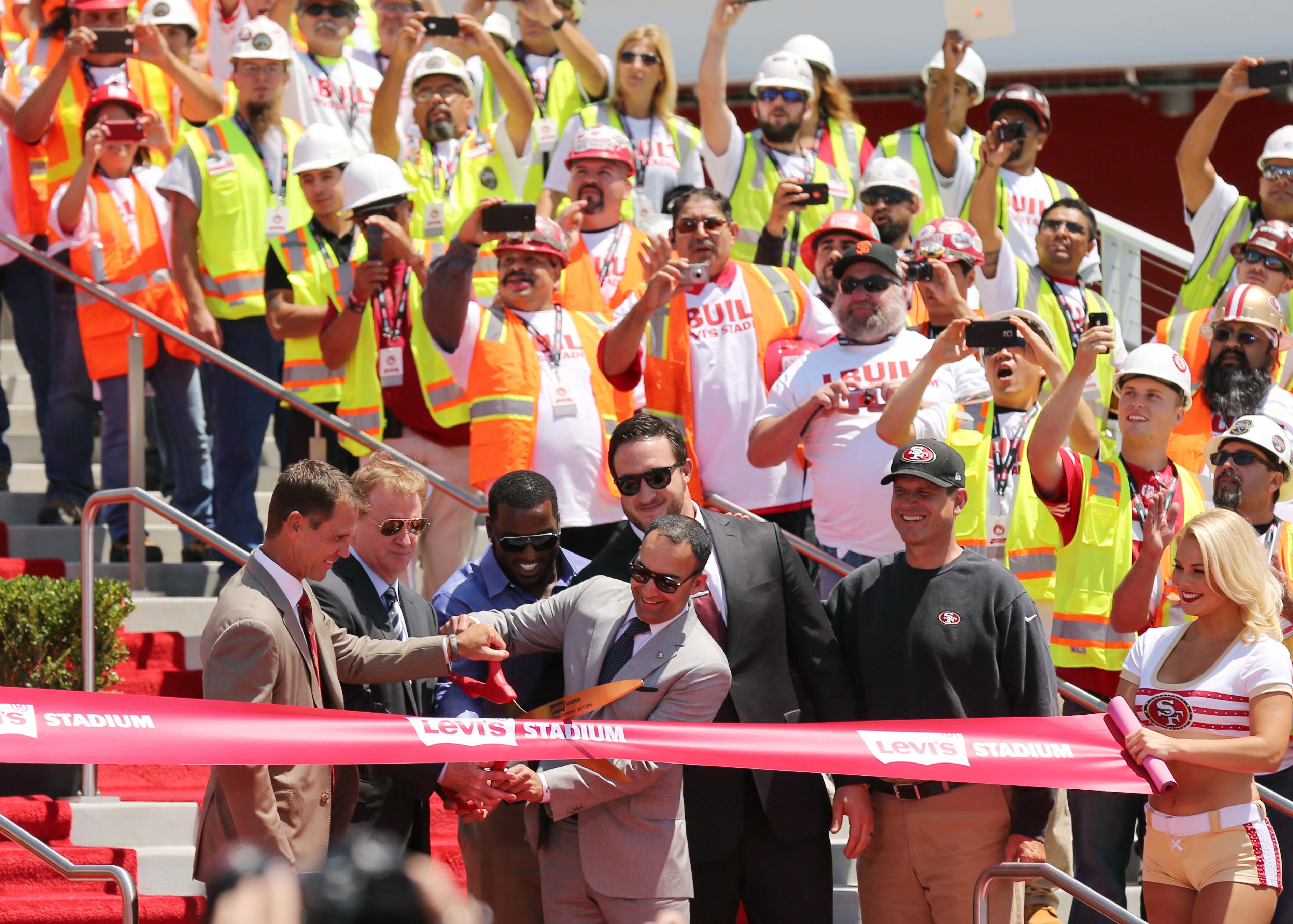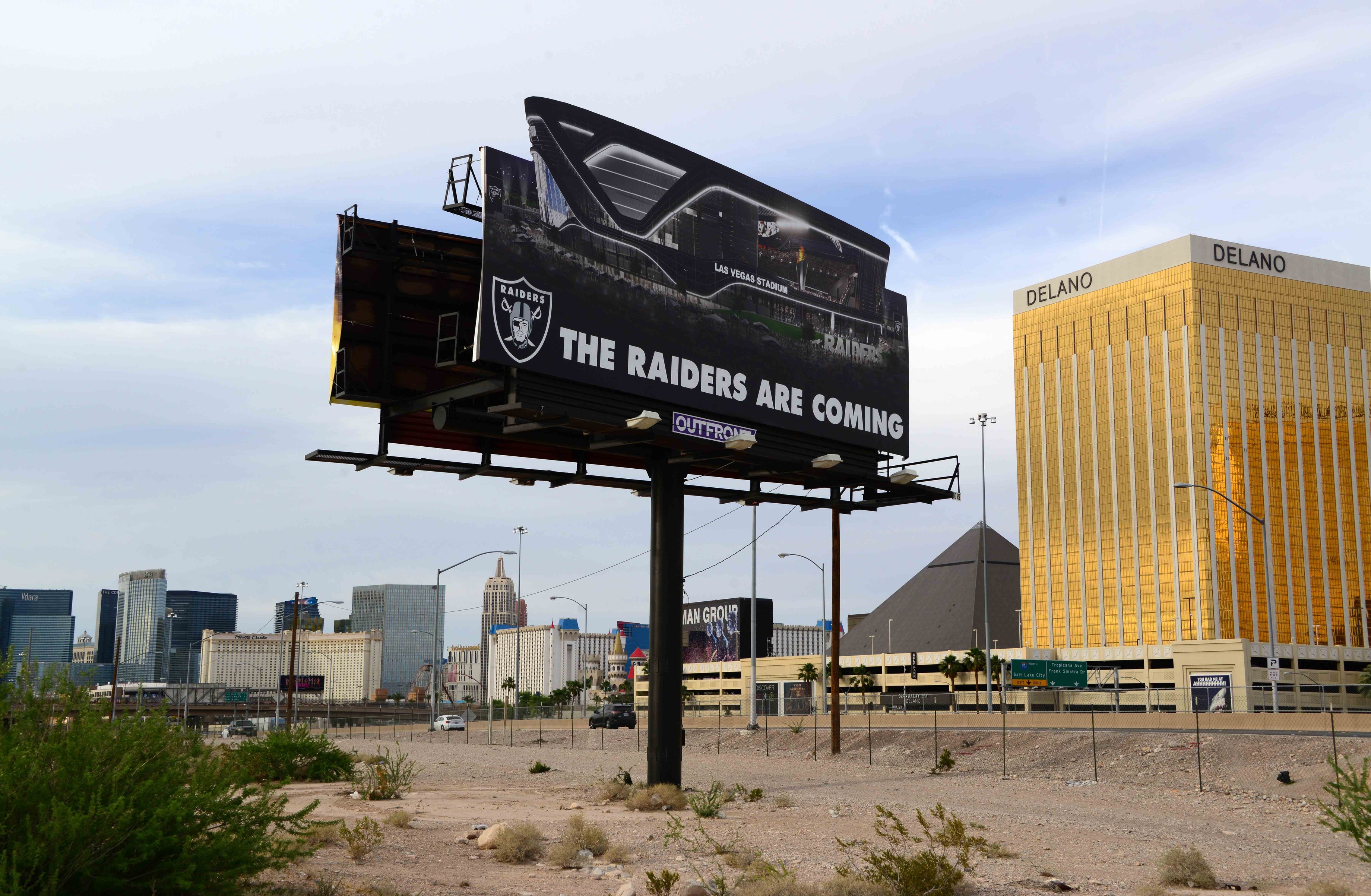The Sports Welfare Silver Bullet

America needs an intervention. And no, I'm not referring to the current occupant of the White House's media habits. I'm talking about our hopeless, helpless, hapless addiction to spending taxpayer money on sports stadiums. It's the public-policy equivalent of trading a perfectly good cow for a handful of magic beans—only in this case, the giant moves to Los Angeles for a bigger, better castle while we're stuck servicing the $144 million debt on our now-useless beanstalk.
Fortunately, I have just the idea: a 100 percent federal tax, paid for by sports teams, on all state and local spending designed to benefit them.
Perhaps that sounds excessive. Punitive, even. A hundred percent? When they set the Death Star to full power, it blew up an entire planet. Only that's the point. Because when it comes to giving billionaire team owners millions of dollars that they absolutely do not need—the better to construct glorified product showrooms that they otherwise could absolutely finance on their own, the same way every other business does—we're the nation that just can't quit, forever swearing that this time, things will be different.
Right after the next hit, of course.
In Georgia, they're spending more than $600 million on shiny new football and baseball stadiums to replace older, less shiny football and baseball stadiums that collectively cost taxpayers over $200 million in the 1990s. In Texas, they're forking over an estimated $500 million (and perhaps far more) for a baseball stadium with—take me in to the ballgame—air conditioning. In Nevada, a planned football stadium will be soaking up $750 million of subsidies, the largest-ever transfer of public cash to an NFL owner's private pockets, bigger than the $619 million spent on Indianapolis' Lucas Oil Stadium in 2008.
Even in California, spiritual home of the rehab clinic and a state where sober, right-thinking citizens said thanks but no thanks not once but twice to recent NFL efforts to pickpocket public coffers, taxpayers will be on the hook for as much as $160 million in tax breaks and other costs connected to the ongoing construction of a new stadium for the Rams and the Chargers.
According to Harvard University professor Judith Grant Long, Americans spent roughly $20 billion on 106 sports stadiums built between 1990 and 2010. And it isn't just state and local governments picking up the tab: according to a study from the Brookings Institution last year, the federal treasury has lost $3.7 billion in revenue since 2000 because the bonds used for stadium construction are tax-exempt. Which means that even if you hate the New York Yankees and live nowhere near the Bronx, you still helped contribute a whopping $431 million subsidy to the construction of the new Yankee Stadium.
Sports stadium welfare is a lousy investment at every level of the game; in fact, unless they're being paid by sports teams, most experts agree that cities hoping to stimulate their economies would be better off literally showering cash on the streets, Joker's parade-style.
Like the Wall Street bailouts, stadium subsidies socialize risk and privatize profit. When funded by sales taxes or local lotteries, they shift costs predominantly onto middle- and lower-class citizens. Even when municipalities try to pass the buck to non-locals by drawing on tourist or rental-car taxes, arena welfare still carries an enormous opportunity cost: every dollar spent on refurbishing Atlanta's Phillips Arena, for example, is a dollar not spent on schools or roads, or on cutting property taxes.
Still, we can't stop ourselves. In 2003, taxpayers in Glendale, Arizona, spent roughly $186 million on a new hockey arena—an amount that will climb to almost $224 million when construction bonds are fully paid off in 2033. The public has since coughed up roughly $70 million in additional operating costs, and cut the staffing of city departments to cover those expenses.
The payoff? Glendale now finds itself wrangling with the Arizona Coyotes over the team's desire for another taxpayer-financed building that's closer to where most of its local fan base lives.
 |
| When someone mentions a federal tax on stadium subsidies. Photo by Kirby Lee-USA TODAY Sports |
How would it work for sports? Simple. Suppose you're the Milwaukee Bucks, and suppose Wisconsin politicians give you between $250 and $400 million to build a new stadium. Under Rolnick and Burstein's plan, the Internal Revenue Service would subsequently hand you a tax bill for the exact same amount.
Just like that, sports stadium welfare would be dead and buried. No more promising to pay the Cincinnati Bengals for a future "holographic replay system" when you're already reeling from stadium debt service that figures to cripple your municipal budget for years. No more giving the Minnesota Vikings roughly $500 million for a new stadium—and then allowing the franchise to collect the money for the naming rights to a nearby parking garage, too.
"If you're the owner of the Vikings, why bother coming to the city or state for anything?" Rolnick told me in 2013. "You'll just have to turn it over to the federal government. Overnight, all of the bidding wars end. The [Cleveland] Browns never move to Baltimore. And the real beauty is that it's a tax you'll never have to collect.
"It was a simple idea. And it scared the hell out of [sports owners]."
Maybe it scares you, as well. After all, America is a representative democracy, a nation rooted in self-governance. Can't We, the People trust ourselves to make wise spending decisions? To stop coughing up half a billion dollars so the Miami Marlins can have a nicer office with brand-name art?
No. We, the People most certainly cannot. Team owners versus the general public is a one-sided fight, a classic example of concentrated gain taking precedence over diffuse pain. When you're an owner, a government-funded stadium is a once—well, maybe twice—in-a-lifetime opportunity that will save you hundreds of millions of dollars while boosting both your regular revenue and overall franchise value. By contrast, the price of said stadium is barely noticeable to any individual taxpayer: the aforementioned $3.7 billion in lost tax revenues Brookings found comes out to just $27 per each federal tax return filed in 2015.
Small wonder, then, that owners go to the wall for subsidies—and by "the wall," I mean the bank. In Texas, where citizens voted to fund half of a new $1 billion ballpark for the Rangers in November, the pro-stadium-subsidy group Vote Yes! Keep The Rangers raised a reported $617,707, mostly from the Rangers organization itself, and spent $564,479 in a single campaign reporting period leading up to Election Day. An opposing group, Citizens for a Better Arlington, raised a little less than $8,000 and spent $2,264 in the same time. That kind of disparity is hardly unusual: in Santa Clara, California, backers of a new stadium for the San Francisco 49ers spent almost $5 million in 2010 on a successful campaign to convince voters to create a public agency to own and finance the building, while an opposing group raised about $20,000.
"These guys are good," Rolnick told me in 2013. "They're really good. And it's an old problem. Look at the subsidies that go to farmers. Looks at the billions they get. You have a small number of people with a huge potential gain going against a large number of people with a small potential individual loss. Who is going to fight harder? That's what we're up against."
 |
| When you outspend your political opponents by a 250-1 margin. Photo by Kelley L Cox-USA TODAY Sports |
Even when we take a long look in the mirror, resolve to stay clean and sober, and choose sparkling water with lime instead of funding a new San Diego Chargers stadium, there's another problem: we can't trust our duly elected representatives to do the right thing, either. Team owners know how to play them even better than the public, typically through a carrot-and-stick approach.
The stick? Threatening to decamp to another city. No local politician wants to be remembered as the Mayor Who Lost the Team—and plenty would love to be remembered for the opposite. Former Washington, D.C., Mayor Sharon Pratt Kelly once described civic extortion by sports franchises as "a prisoner's dilemma of sorts." If no mayor gives in to the demands of a franchise shopping for a new home, she said, then the team will stay where they are. But if "Mayor A is not willing to pay the team's requested price, Mayor B may think it is advantageous to open up the city's wallet. Then to protect his or her interest, Mayor A often ends up paying the demanded price."
As for the carrot? Follow the money. For decades, Rolnick has traveled across the country, testifying in local hearings against sports stadium welfare. He comes alone, delivers a killjoy message, presents boring numbers. Meanwhile, teams enlist small armies of lawyers, lobbyists, public relations people, and fans. They make cheery, ludicrously Panglossian pitches: Give us $87.5 million for a new soccer stadium, and it will be the defining accomplishment of our generation, as well as something that will heal Charlotte's racial divisions. Build us a new football stadium, and annual tourism in Las Vegas will increase by 10 to 20 million people.
When the public hearings are over, Rolnick told me, those same team operatives work the offices and meeting rooms of the politicians involved. "If you're a governor, it's 'You build me an office tower, you build me a stadium, and next election, I'll be in your corner,'" he said. "There are big incentives to do this."
Given those incentives, it's hardly surprising that Cleveland's city council voted to spend $70 million to renovate a basketball arena—and then put the kibosh on citizens demanding a public referendum on the planned outlay. Or that local politicians in Cobb County, Georgia, approved a plan to spend at least $300 million on a new suburban Atlanta baseball stadium without any public debate, even standing in hallways to avoid a quorum and therefore get around the state's open-meetings laws. Or that city officials in Miami called a secretive midnight meeting to approve selling $500 million of bonds to fund a baseball stadium that will ultimately cost taxpayers $2.4 billion.
Can voters punish politicians for stupid spending after the fact? Of course. Cobb County Commission Chair Tim Lee lost his seat in a subsequent election, and Miami mayor Carlos Alvarez lost in the largest recall of any local politician in American history.
Problem is, accountability comes too late. The money's already gone. We need a law that will stop sports stadium welfare before it starts. And not legal half-measures. Those won't work. Never have. Sports owners aren't just rich and motivated. They're creative. With hundreds of millions at stake, they always find ways around limited efforts to stanch the public's financial bleeding.
To wit, in 1986, former Senator Pat Moynihan (D-NY) was able to close a loophole for federal tax-exempt private revenue bonds being used for stadium construction. What happened next? Sports teams began talking local governments into financing stadiums with tax-exempt general-purpose bonds that ultimately shifted more costs onto the public, producing the $3.7 billion price tag estimated by Brookings.
A decade ago, Seattle voters passed a law forbidding the city from financially helping sports teams unless the investment yields a profit for taxpayers on par with U.S. Treasury bond yields; as the Seattle Times explained, prospective NBA owner Chris Hansen nearly landed the Sacramento Kings by devising a clever way around the prohibition. Even state constitutions are no match: while Washington's plainly states that taxes "shall be levied and collected for public purposes only," in 1996 the state's Supreme Court ruled that the public could help pay for a new Seattle Mariners stadium.
Other ideas for stymieing stadium sports welfare have shortcomings. Missouri lawmakers have proposed making sports owners who relocate their teams to other states responsible for any stadium debt left behind, and Senator Claire McCaskill (D-MO) has considered proposing the same law on a national scale. It's a perfectly fine concept, but it fails to cover the total and totally unnecessary debt taxpayers take on in the first place.
Sports law professor Marc Edelman has suggested a federal law that would remove the Sports Broadcasting Act's limited antitrust exemption from any league where at least one team accepts public stadium funding without giving taxpayers a cut of the building's revenues. Again, that would be an improvement over the status quo, but it wouldn't prevent team owners from continuing to profit at the public's expense.
 |
| Pay to play. Photo by Kirby Lee-USA TODAY Sports |
In fact, it was a 1991 effort by Minnesota–based Northwest Airlines to secure about $1 billion in subsidies that first piqued Rolnick's interest in this phenomenon. The company was in financial tatters. The state was in a recession. Rolnick did the math. The proposed deal was a lousy investment, so Rolnick advised against it, loudly and publicly. "Northwestern said, 'We'll create jobs,'" he said. "I said, 'All companies create jobs. If we do this for you guys, we could do this for anybody.' But that's not the government's role. We are supposed to build schools and roads. Not bail out companies."
Rolnick says a high-ranking state politician pulled him aside to explain what was really happening: This is about Northwest's headquarters. If we don't do it for these guys, they'll leave. And we'll lose jobs. When I spoke with Rolnick a few years ago, he was still incredulous.
"What happens is that from a national economic perspective, you get a zero-sum game," he said. "Not a single job created. You're just moving them around. So these subsidies make no economic sense. But at a local level, they're very seductive. You're a mayor, a governor, you attract a business like this, you get a win. But if you think about it like a war, you're just winning a battle. Then the next state or city comes along and bids below you.
"The sports teams are the best at playing this game by far. No pun intended. And my criticism isn't really against the CEOs or the owners of the teams. I would do the same if I was them. My criticism is of Congress. They can fix the rules of the game."
Therein lies the rub: historically, Congress has shown little appetite for fixing anything. When the Congressional Research Service released a 1996 report showing that tax-exempt bonds were costing the federal treasury about 34 percent of new stadium construction costs, Senator Moynihan introduced the Stop Tax-Exempt Arena Debt Issuance Act to rectify the matter. Local governments already committed to funding new projects—like a $292 million football stadium in Nashville—lobbied against the bill. It floundered. Three years later, former Vice President Joe Biden, then a Delaware Senator, co-sponsored a bill that would have required MLB and the NFL to pay up to 50 percent of construction costs for new stadiums. Again, no dice.
That same year, former Representative David Minge (D-MN) introduced a bill in the House that essentially would have made the Rolnick-Burstein proposal law. It died in committee. No one introduced a similar measure in the Senate. "[Former Minnesota Senator] Paul Wellstone wanted to introduce it," Rolnick said. "But Minge didn't want it to be a Minnesota bill. They got [Arizona Senator John] McCain's people interested in it. I had some very influential senators interested in it. But when they canvassed their colleagues, it didn't go anywhere.
"I think the sports teams got it killed. But if I had to do it again, I might have narrowed it to the sports teams. Because I think the public would get it. You need grassroots outrage over this stuff. We're closing schools. And we're going to build another stadium?"
Putting an end to sports stadium welfare—and the competitive conditions that lead to it—is eminently doable. The European Union has rules that successfully prevent inter-country bidding wars; so do the United States and Canada under the North American Free Trade Agreement.
A Death Star federal tax would work. What's missing is the will to enact one. And ultimately, that's not the fault of anyone in Congress. It's on us—super fans and sports know-nothings alike, all of us taxpayers, unwilling or unable to admit that we have a bad habit. An addiction we simply can't kick on our own. Decades ago, former Senator Byron Dorgan (R-ND) joked that "the only remaining healthy public housing is in sports stadiums for wealthy team owners." It was, in the parlance of the recovery movement, a moment of clarity.







